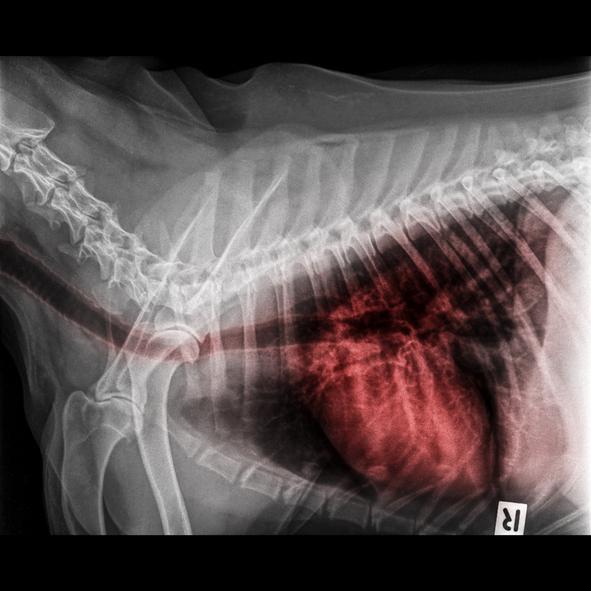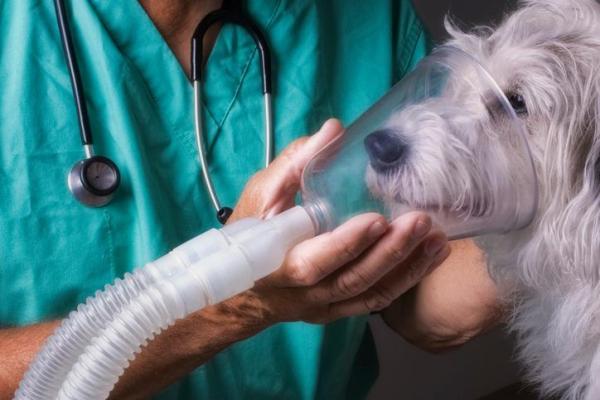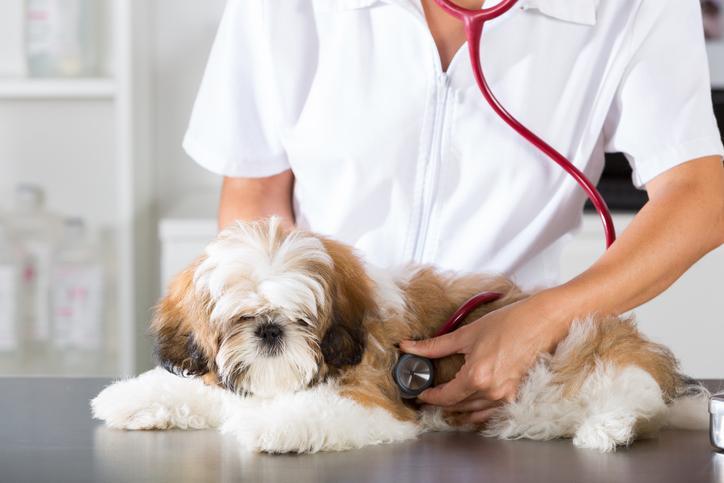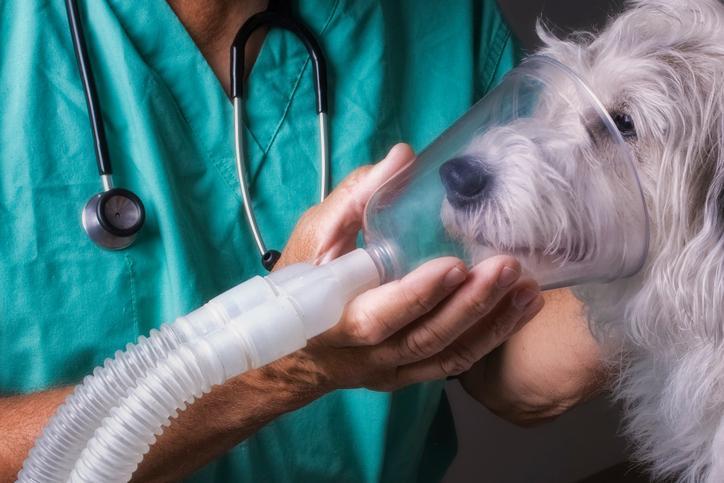Pulmonary Edema In Dogs - Symptoms, Causes and Treatment



See files for Dogs
In this AnimalWised article we will be discussing everything you need to know about pulmonary edema in dogs. Pulmonary edema is the accumulation of fluid in the lungs and can occur from multiple causes, such as cardiomegaly or cancer. Finding out the pulmonary edema cause is key when prescribing the correct treatment.
For more about the symptoms of pulmonary edema in dogs, treatment and diagnosis, keep reading here.
Dog pulmonary edema: dog fluid around lungs
Pulmonary edema is formed from an accumulation of fluid in the lungs. This fluid in a dog’s lungs makes it difficult for the dog to breathe. Symptoms can be mild or severe, depending on the severity of the fluid buildup in the alveoli (tiny air sacs in the lungs).
Pulmonary edema in dogs can be acute or chronic, such as cardiogenic pulmonary edema, linked to heart problems. It is important to know, therefore, that pulmonary edema is not a disease in itself, but rather the symptom of another alteration.
For more, we recommend reading our article about dog breathing difficulties- causes and treatment.
Pulmonary edema in dogs: causes
Firs thing we need to do is distinguish between cardiogenic, non-cardiogenic and neurogenic pulmonary edema in dogs (which is less frequent).
Cardiogenic pulmonary edema in dogs originates from heart disease. When the heart fails there is a reflux of blood to the lungs, liver, limbs, etc. This reflux increases vein tension, which is what causes fluid to leak into the lungs or abdominal cavity. Because of this fluid in the lungs, a dog will cough excessively. For more, we recommend reading about heart murmur in dogs.
Pulmonary edema in dogs indicates an insufficiency in the left part of the heart. In contrast, when the lesion is on the right side, fluid accumulates in the abdomen. This causes ascites, edema in the legs and edema in the chest cavity, which is known as a pleural effusion. If the fluid accumulates in the bronchioles of the lungs, the dog may cough up reddish, frothy fluid. Dogs with this problem are likely suffering from cardiomegaly and pulmonary edema. Cardiomegaly referring to an enlargement of the heart[1]. For more, we recommend reading, dog coughing - is it normal?
Non-cardiogenic pulmonary edema does not originate from a heart disease. Some non-cardiogenic pulmonary causes in dogs include:
- Asphyxia.
- Septicemia (generalized infection).
- Pancreatitis.
- Trauma.
- Pneumonia.
- Poisoning.
- Smoke inhalation.
Neurogenic pulmonary edema in dogs occurs after episodes of convulsions in which the nervous system is affected, specifically those which act on the involuntary functions of the internal organs. In this case, the blood flow to the lungs is increased excessively, thus causing excess fluid.

Pulmonary edema in dogs: symptoms
Pulmonary edema symptoms in dogs include:
- Agitated breathing or tachypnea (rapid breathing).
- Difficulty breathing or dyspnea. In severe cases a dog may literally drown.
- Weakness.
- Nervousness.
- Strange postures in an attempt to breathe in air.
- Nasal discharge that can be hemorrhagic.
- Occasional dry cough or, if it evolves, constant and humid coughing.
- In more serious cases, any movement can cause the dog’s mucous membranes to turn blue (cyanosis) due to lack of air.
If you notice any of the above symptoms of pulmonary edema in dogs, we recommend consulting your veterinarian as soon as possible.
Pulmonary edema in dogs: diagnosis
Diagnostic tests such as auscultation, blood tests, chest x-ray or ultrasound are used to diagnose pulmonary edema in dogs. A veterinarian is also likely to perform an electrocardiogram, urine test and blood pressure measurement test in order to diagnose dog pulmonary edema.

Pulmonary edema in dogs: treatment
Treatment of pulmonary edema in dogs will depend on the specific cause. In case of emergency, a veterinarian will supply the dog with oxygen. Sometimes, sedation may need to be administered as well as diuretics to help eliminate excess fluid. In this case, in order to avoid dehydration, a professional may also prescribe fluid therapy.
Other drugs that may be prescribed include vasodilators or antihypertensives. A dog suffering from pulmonary edema must be monitored constantly to control heart and kidney function. For more, we recommend reading our article about homemade solution for dehydrated dogs.
Pulmonary edema in dogs: care
Pulmonary edema in dogs, especially when acute, is incredibly dangerous and therefore both treatment and recovery are essential!
Cardiogenic edema in dogs suffering from heart disease can cause mild symptoms. In these cases, when this edema is long-lasting, we recommend:
- Take into account advice and medication prescribed by a veterinarian. Special attention must be paid to the dosage and time administration of these prescribed drugs.
- Avoid subjecting the dog to intense exercise.
- Provide your dog with feed specific to heart problems.
- Always make sure your dog has water at its disposal. This is especially important in the case that your dog has been administered diuretics, making sure that your dog does not become dehydrated.
- Be aware that a dog that is taking diuretics will urinate more than normal.
Pulmonary edema in dogs: life expectancy
Severe cases of pulmonary edema in dogs can result in the death of the animal if not treated in time (due to lack of received oxygen). A dog suffering from cardiogenic pulmonary edema can live for years, as long as the dog remains subject to constant veterinary check-ups and receives adequate treatment. Thus, the life expectancy of a dog with pulmonary edema will depend on the underlying cause.
This article is purely informative. AnimalWised does not have the authority to prescribe any veterinary treatment or create a diagnosis. We invite you to take your pet to the veterinarian if they are suffering from any condition or pain.
If you want to read similar articles to Pulmonary Edema In Dogs - Symptoms, Causes and Treatment, we recommend you visit our Other health problems category.








